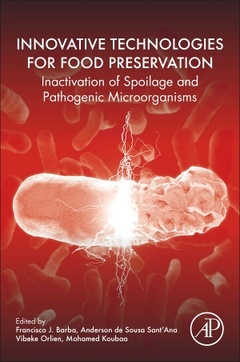Innovative Technologies for Food Preservation Inactivation of Spoilage and Pathogenic Microorganisms
Coordonnateurs : Barba Francisco J., de Souza Sant'Ana Anderson, Orlien Vibeke, Koubaa Mohamed

Innovative Technologies for Food Preservation: Inactivation of Spoilage and Pathogenic Microorganisms covers the latest advances in non-thermal processing, including mechanical processes (such as high pressure processing, high pressure homogenization, high hydrodynamic pressure processing, pressurized fluids); electromagnetic technologies (like pulsed electric fields, high voltage electrical discharges, Ohmic heating, chemical electrolysis, microwaves, radiofrequency, cold plasma, UV-light); acoustic technologies (ultrasound, shockwaves); innovative chemical processing technologies (ozone, chlorine dioxide, electrolysis, oxidized water) and others like membrane filtration and dense phase CO2. The title also focuses on understanding the effects of such processing technologies on inactivation of the most relevant pathogenic and spoilage microorganisms to ensure food safety and stability.
Over the course of the 20th century, the interest and demand for the development and application of new food preservation methods has increased significantly. The research in the last 50 years has produced various innovative food processing technologies and the use of new technologies for inactivation of spoilage and/or pathogenic microorganisms will depend on several factors. At this stage of development there is a need to better understand the mechanisms that govern microbial inactivation as induced by new and innovative processing technologies, as well as suitable and effective conditions for inactivating the microorganism.
PART A: Introduction 1. Conventional technologies 2. Main groups of microorganisms of relevance for food safety and stability 3. Spoilage non-spore forming bacteria 4. Spoilage spore forming bacteria 5. Pathogenic non-spore forming bacteria
PART B: Microbial inactivation after innovative processing of the main groups of microorganism of relevance for food safety and stability 1.Mechanisms of microbial inactivation by emerging technologies 2. Effects on innovative processing technologies on microbial targets based on food categories: differences between traditional methods of food preservation and emerging technologies 3. Designing, modelling and optimizing processes to ensure microbial safety and stability through emerging technologies
PART C: Consumer’s, technological, environmental and regulatory aspects of application of emerging technologies for food preservation 7. Consumer acceptance and marketing of foods processed through emerging technologies 8. Environmental footprint of emerging technologies, regulatory and legislative issues 9. Technological hurdles and research pathways on emerging technologies for food preservation
Nowadays, Dr. Barba is serving as Associate Editor of the prestigious Journals “Food Research International, "Journal of Food Composition and Analysis", "Journal of Food Processing and Preservation", “Molecules and "Frontiers in Nutrition", among others.
Assistant Professor in Food Microbiology at the Department of Food Science, Faculty of Food Engineering, University of Campinas, Brazil. He has a Bachelor degree in Industrial Chemistry (USS, Brazil), Master of Science in Food Science (UNICAMP, Brazil) and PhD in Food Science (USP, Brazil), including a one-year internship at Rutgers - The State University of New Jerse
- Serves as a summary of relevant spoilage and pathogenic microorganisms for different foods as influenced by the application of innovative technologies for their preservation
- Provides readers with an in-depth understanding on how effective innovative processing technologies are for controlling spoilage and pathogenic microorganisms in different foods
- Integrates concepts in order to find the optimum conditions for microbial inactivation and preservation of major and minor food compounds
Date de parution : 09-2017
Ouvrage de 326 p.
15x22.8 cm
Thème d’Innovative Technologies for Food Preservation :
Mots-clés :
Cold plasma; Consumers' acceptance; Conventional methods; Conventional technologies; Dense phase; Electrical fields; Electromagnetic; Emerging food technologies; Emerging technologies; Environmental footprint; Food contamination; Food preservation; Food processes; Food processing; Foodborne outbreak; Gastroenteritis; High hydrostatic pressure; High hydrostatic pressure (HPP); High pressure; High-pressure homogenization; High-pressure processing; Industrial application; Mechanisms of action; Membrane filtration; Microbial inactivation; Microbiological; Microorganisms; Microwave; Microwave (MW) heating; Microwaves; Modeling; Molds and yeast; Multiphysics; Novel; Novel food; Ohmic heating; PUV light; Parasites and viruses; Preservation; Protozoa; Pulsed electric fields; Pulsed electric fields (PEF); Regulation and legislation; Research; Simulations; Spoilage; Spore-forming bacteria; Spores; Technological limitations; Technology challenges; Technology perception; Traditional technologies; UV-C radiation; Ultrasound; Ultrasounds; Ultraviolet; Virus



